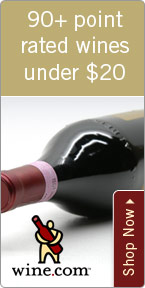A Modest Point System Proposal

Wednesday - March 07, 2007
| Share
 Del.icio.us
Del.icio.us
2005 Laporte
Domaine du
Rochoy
Sancerre:
refreshing
and racy
Numerical wine ratings: They are impossible to avoid if you are a wine drinker. Anyone who sells wine will use whatever “high” rating (read 90 points or above) from whatever publication, reputable or not, to help sell the wine.
As much as I dislike the point system, and try not to use it myself, my thoughts tell me that it is here to stay.
Wine, like many other things, will forever be rated numerically.
So many other things in life we rate by a point scale, be it numerical or otherwise. Just look at beauty pageants, restaurants, cars and even cinema.
The wine world is not so immune to such banality in numbers.
In Champagne, vineyards have been classified according to the quality of the fruit each village produces. It is a scale from 80-100 percent. Here, however, each grower is paid the accorded percentage of that year’s price for grapes, which is set by the governing body of Champagne (CIVC). For example, if your vineyard is rated at 95 percent, and the price per ton of grapes that year is $1,000, you would receive $950 per ton of your harvest. That seems logical, right?
Now let me play devil’s advocate for a moment and apply some of this logic to the world of wine ratings. Let’s just say the best palates in the world are indeed those of the wine writers. They are admitted experts in their field. Not only do they taste wines for a living, they must
drink a ton of it, so they must know everything there is to know about the wines they rate. They certainly have more access to any wine in the world than all but the most affluent of wine lovers. So let’s just say that their ratings are right. The quality of the wine can and is determined by the number of points it garners.
Next, by using the same principle that applies to vineyards in Champagne, the higher the score the more expensive the wine should be, and the worse the wine is, the cheaper it must sell for. At the top end, this sort of thing happens already, with the wines garnering top scores rising in price once they are released and are bought and sold by collectors or prospectors. But it does-n’t currently stop the low point-getters from selling their wines for plenty of money even without the recommendation of critics.
Imagine if this system was enforced and each winery was only allowed to sell the wine after it was reviewed by the “experts.” Then according to their rating, that’s how much they could sell their wine for. Basically all wines would be priced according to their score, quality is commensurate
with price. This would help a lot of people with making decisions on what to drink. “Well, Honey, do you feel like having an 89 or 90 tonight? Points, that is.” Wine lists would be so easy to read. You would just have look at the price. You already know how good or bad the wine will be before you order it.
It’s a modest proposal. I know it’s kind of sick, not as sick as Jonathan Swift’s A Modest Proposal, but if you think about it, this is exactly what the point system is already doing. Wines are tasted before they are released. Wines that get top ratings are released with a hefty price tag: They disappear only to reappear with an even higher price tag. Wines that get lower ratings sit on the shelf like lonely dogs in a pen, and those producers can’t sell any more of their inventory, forcing them to drop their prices in order to sell it.
Thankfully, everyone doesn’t agree with the critics. There are plenty of delicious wines that don’t get huge ratings. There are also wines that are highly touted by writers that others, including myself, don’t enjoy. And if you don’t see that, you’re missing the point.
Two wines that I do enjoy: 2005 Laporte Domaine du Rochoy Sancerre ($16) Just plain satisfying white wine (Sauvignon Blanc) terrific aromas and delicious flavors that stick to your palate for a long time: refreshing and racy. 2004 Yann Chave Crozes-Hermitage Le Rouvre ($28) This is for any Syrah fan looking for a great buy. Deep and penetrating flavors that you will not soon forget.
Roberto Viernes is a master sommelier. E-mail .(JavaScript must be enabled to view this email address)E-mail this story | Print this page | Comments (0) | Archive | RSS Comments (0) |
Most Recent Comment(s):












